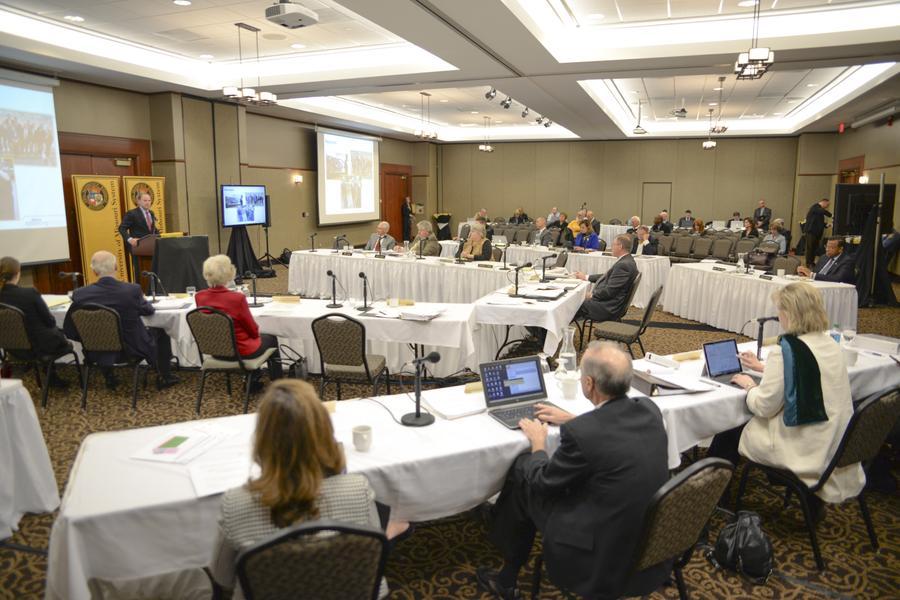In June, MU was censured by the American Association of University Professors for the third time since the creation of the censure list after the AAUP investigated the university following the [firing of assistant communication professor Melissa Click](https://www.themaneater.com/stories/2016/2/25/melissa-click-fired-board-curators/) by the UM System Board of Curators.
According to [the AAUP’s official investigative report](https://www.aaup.org/sites/default/files/UofMissouri.pdf), questions were raised about Click’s “alleged misconduct” and whether it “warranted dismissal and even about whether her actions constituted misconduct at all.” Based on the report’s findings, during AAUP’s national convention on June 18, it was unanimously decided that MU be placed on the censure list.
Since the AAUP’s founding in 1915, the organization has created policies and regulations for the academic profession. In total, AAUP has placed 47 universities around the U.S. on its censure list for violating the 1940 Statement of Principles on Academic Freedom and Tenure, or more simply, professional and ethical guidelines the association believes universities should subscribe to.
According to the AAUP, tenure was created “to promote public understanding and support of academic freedom.”
“A major component of academic freedom is tenure, which protects professors from being fired for teaching or speaking about something that might not be popular,” former AAUP Missouri Conference President David Robinson said in an email.
The Board of Curators disputed allegations against itself in [its official response to the AAUP report in May](https://www.umsystem.edu/ums/news/news_releases/051916_response), stating that “the report also takes its eye off fundamental issues of academic freedom in failing to appreciate fully the impact of Dr. Click’s misconduct on the university’s educational environment.”
Since 1922, the AAUP has investigated MU four times and censured the administration three times “on issues of academic freedom and tenure,” according to AAUP’s investigative report into the Click case.
AAUP Associate Secretary Hans-Joerg Tiede said the AAUP has “no formal relationship” with universities except to “communicate with institutions on our censure list to work with administrations on actions to take to get them off the list.”
The AAUP continues investigating cases after the censure is assigned. For a university to be removed from the censure list, school officials must “prove to AAUP that they have made restitution for the situation and will not engage in such violations in the future,” Robinson said in the email.
The censure list itself was created in 1930 after an investigation of MU’s administration for firing and suspending two professors, Harmon DeGraff and Max Meyer, respectively, due to “a printed questionnaire relating to the changing economic status of women,” according to the AAUP’s incident report.
The most recent censure before June, which took place from 1973–80, was “strikingly similar to the present case,” according to the AAUP’s MU report. In 1970, multiple sociology professors at MU refused to teach as a protest of the Vietnam War.
The UM System Board of Curators and administration were once again accounted to have “had overreacted massively and ominously in taking disciplinary actions, without adequate safeguards of academic due process” when terminating faculty members for conduct in 1970.
In both the 1973 and 2016 case, the AAUP criticized MU’s administration for being pressured politically to act unjustly and biasedly toward faculty members. In January, the Missouri General Assembly demanded the dismissal of Melissa Click, threatening to cut $8 million in funding for the MU system and administration for 2017. AAUP MU chapter member Victoria Johnson [told The Maneater in May](https://www.themaneater.com/stories/2016/5/18/aaup-report-academic-freedom-shared-governance-end/) that the “MU chapter believes state overreach sets a dangerous precedent.”
The first official censure of MU took place in the summer of 1946 after MU dismissed associate professor of speech Lee S. Hultzén on grounds of alleged sexual harassment, according to the AAUP’s report. In a letter from Hultzén to College of Arts and Science Dean W.C. Curtis and MU President Frederick A. Middlebush, Hultzén stated that he “naturally [did] not wish to get involved in a public investigation.”
The AAUP defended Hultzén in their report, stating that “the national officers of the Association are of the opinion that to discontinue Professor Hultzén’s services would be unjust to him and would constitute a breach of a moral obligation.”
In concern to the university itself, Robinson said in the email, “the repercussions of censure are mostly moral.”
_Edited by Claire Mitzel | [email protected]_














